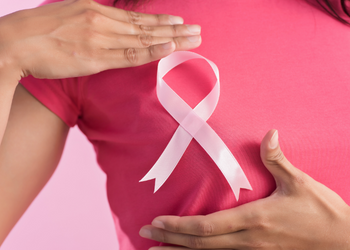Vaginal dryness as a side effect of cancer therapy

Vaginal dryness as a side effect of cancer therapy
How a hormone-free cream for vaginal dryness can help cancer patients
Vaginal dryness is a common side effect during or after cancer treatment. The discomfort often occurs in connection with chemotherapy, radiation or anti-hormone therapy – for example, for treating breast cancer. In this article you will learn about the relationship between vaginal dryness and different types of cancer treatment, and options to treat vaginal dryness during and after cancer therapy without hormones.

What is vaginal dryness?
Vaginal dryness is a general feeling of dryness in the vagina, but it is often also noticeable in the vaginal entrance and external intimate area. Irritation, itching, burning or pain can occur and be very uncomfortable for the women affected.
Vaginal dryness caused by cancer therapy
Cancer is often treated with chemotherapy or radiotherapy to destroy the aggressive cancer cells and prevent further growth. Many oncological treatment methods are very targeted and comparatively gentle, but unfortunately, they are usually accompanied by side effects. One of these side effects can be vaginal dryness.
Since treating the malignant tumour is the primary concern, less attention may be paid to vaginal dryness as a side effect. Nevertheless, it can cause considerable distress. The symptoms are unpleasant and may add to the physical and emotional burden.
Vaginal dryness due to chemotherapy
Chemotherapy is the treatment with so-called cytostatic drugs. They have an impact on cell division and are thus supposed to inhibit the growth of cancer cells. However, the cell division of healthy cells is also impaired to a certain extent.Therefore, side effects such as dry and itchy skin, diarrhoea and hair loss often occur during chemotherapy. However, the fact that the skin of the vagina and the external intimate area can also be affected, is rarely acknowledged – although the adverse effects of vaginal dryness can lead to considerable discomfort.

Vaginal dryness as a side effect of radiotherapy
Radiotherapy in the pelvic area can also affect the vaginal skin and cause vaginal dryness. In certain abdominal cancers – for example, cervical cancer –, radiation aims to target and destroy the cancer cells. Unfortunately, it may also harm healthy tissue in the vagina. This can result in pain, itching and a feeling of dryness.

Vaginal dryness due to anti-hormone therapy
Oestrogen, the female sex hormone, plays a central role in some types of cancer, as it can be involved in the growth of certain tumours. This is true for most breast cancers. Anti-hormone therapy can therefore entail the use of various drugs that either suppress the body's natural production of oestrogen or its effect. This is supposed to inhibit the growth of oestrogen-dependent tumours.
However, the production of vaginal fluid and a healthy vaginal skin are influenced by oestrogens as well. The use of anti-oestrogens, GnRH analogues or aromatase inhibitors as part of anti-hormone therapy can therefore also affect the vaginal skin. This often results in dryness in the vagina, at the vaginal entrance and in the external intimate area along with itching, burning and pain.

Hormone-free treatment of vaginal dryness during and after cancer treatment
Fortunately, vaginal dryness can be treated very well with special hormone-free moisturising creams or vaginal pessaries. Dr. Wolff's V-san Moisturising Cream and Dr. Wolff's V-san Moisturising Cremolum in the form of pessaries provide nourishing lipids. Those restore suppleness to the skin in the vagina and external intimate area – without the use of hormones.
Hormone-free moisturising products have a decisive advantage, especially for women with an oestrogen-dependent type of cancer. They usually have to avoid products containing hormones.
Dr. Wolff's V-san Moisturising Cream is hormone-free and is applied inside the vagina using an applicator or to the external intimate area. The dual effect of providing moisture and soothing lipids helps to relieve the symptoms. This distinguishes it from a water-based gel, which lacks soothing lipids. A user study with breast cancer patients found their symptoms improved significantly. By the way: the moisturising cream can also be used before intercourse.
If you do not want to use an applicator, you can relieve the typical symptoms of vaginal dryness such as a feeling of dryness, burning, itching and pain with the soft-melting pessaries of Dr. Wolff's V-san Moisturising Cremolum, which are also hormone-free. Like the cream, these contain lactic acid and care for the vagina and keep it supple.

|
The very good tolerability as well as a highly significant improvement of the typical symptoms of vaginal dryness after the application of Dr. Wolff's V-san Moisturising Cream was proven by a clinical study with 117 breast cancer patients1. |
Study with breast cancer patients on the application of Dr. Wolff's V-san Moisturising Cream
The objectives of the study published in 2019 were:
- to investigate the tolerability and efficacy of Dr. Wolff's V-san Moisturising Cream in breast cancer patients.
- to determine whether the patients' subjective symptoms can be improved
- and at the same time, whether an objective improvement of the vaginal dryness can be confirmed by the doctor.
90% of the patients as well as the treating physicians rated the tolerability of Dr. Wolff's V-san Moisturising Cream very good or good.
88% of the patients as well as the treating physicians rated the efficacy of Dr. Wolff's V-san Moisturising Cream very good or good.
The number of patients suffering from dryness, burning, itching and pain independent of sexual intercourse was significantly reduced. In addition, the severity of redness or the smallest, pinhead-sized bleedings (petechiae) could also be significantly reduced by using the moisturising cream1.









